A Tramp Aboard, with Apologies to Mark Twain. A river cruise from Switzerland to Germany to France.
Before I begin, I want you to understand that river cruises are whatever you make of them. They’re good for some, and not so good for others. This one’s my third, and to a large extent, they are all more alike than different regardless of where you are traveling. Just keep this in mind. They’re never as good as the print ads and TV spots. Why? Because they can’t be.
Yet still you are here.
Travel notes, Day 1, Part 1, Queens.
Off-site long-term parking.
Every great journey begins with humble first steps. A trailer, rickety steps, and an international welcome. This is not yet a time to spell R-E-G-R-E-T.

Travel notes. Day 1, Part 2, JFK.
First flight attendant I interacted with aboard Swiss Air sounded like and looked a bit like Teb (Jed Rees) from the film, Galaxy Quest.
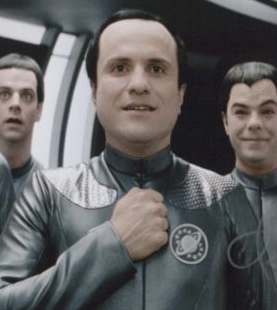
Hope the captain isn’t Tim Allen. Or Peter Graves, for that matter.
Travel notes. Day 2, Zurich.
Arrival in Zurich.
Arrived at Flughafen Zürich at 7:00am Flughafen Zürich time. We were whisked onto an airport bus by a cheery river cruise rep we spotted outside an airport bar. An overnight 7+ hour from JFK in one step above steerage class reminded me of the hardships my grandparents and Dad experienced coming to NYC from Poland in 1923 aboard a steamship, only they likely had better coffee and more knee room.
Sara and I soon found ourselves outside Swisscom, the Swiss telecoms giant on whose network I am currently roaming. A quick glance at our map and a quick look around convinced us we were not anywhere near water, let alone aboard the long ship we were to set sail on, the Herja, which in the language Vikings used 2000 years ago means “herja.”

After a brief investigation we discovered we were NOT aboard a ship but instead at the Zurich Renaissance Tower Hotel, directly across from Swisscom headquarters, where we would stay for Days 2 and 3.
Desperately needing coffee we walked across the plaza outside our hotel to Steiner Flughafebak, a bakery, where both of ordered the most delicious coffee we have tasted since leaving home yesterday.
And we tried to pay for our coffee in the local currency of Guatemala, quetzales, a currency that at best is close to worthless. No good. Here we had to use Swiss francs, a currency on par with the euro, and just a tad more valuable than the US dollar. Our two coffees, and what appeared to be some sort of cheese danish Sara ordered, came to close to 140 US dollars ($94 Canadian). And worth every quetzal … check that … Swiss franc.
Travel notes. Day 3, Zurich Day 2, Part 1.
Four jokers. Comparisons and similes while waiting for a Swiss Godot.
Xi Jinping offering to mediate in Ukraine is like the Joker offering to mediate a dispute between Batman and The Riddler.

Ron DeSantis isn’t like Donald Trump with a brain. He’s more like Benito Mussolini without a uniform.

Vladimir Putin visiting Crimea on the anniversary of Russia’s 2014 annexation is like Lauren Boebert visiting El Salvador on the anniversary of the 1973 overthrow of Salvador Allende.

Donald Trump calling for protests if he’s indicted in NYC for hush payments to a certain adult film star is like Donald Trump calling for protests in Washington over a certain stolen election.


Travel notes. Day 3, Zurich Day 2, Part 2.
Stuck aboard the Wadenswil with the Lake Zürich blues again.
Wadenswil in German means Wadenswil.


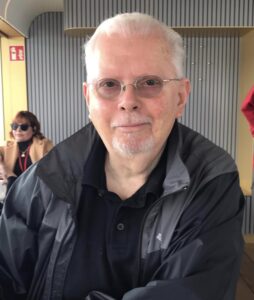
We are resigned to our fate as small pebbles of sand along the sea of humanity, all while tiny raindrops can be heard on a corrugated tin roof soon after being amazed while watching a chicken cross the road – not to get to the other side – but to place a pick-up order at Al-Mouchtar, a schawarma joint in Zürich just a couple of days before Winter ends, Spring begins, cobwebs fall away, romance fills the air, and we can be heroes, just for one day. I, I will be king, and you, you will be queen. Oh we can beat them, for ever and ever. Then we could be heroes, just for one day.
(With apologies to Brian Eno and David Bowie)
Travel notes. Day 4, Basel.
Bank failures are no laughing matter.
As of this writing, we have yet to board what I’m beginning to believe is an imaginary long boat. We just did a walking tour in Basel, the homes of UBS and Credit Suisse, and everyone we see on the streets is crying, depressed, or both because of the international consequences of this current banking crisis. Chocolate shops are shuttered, Swiss cheese is running through the streets of Basel, Swiss watches have all stopped telling time, and fondue is now a dirty word.
Our tour guide, George, who was described before we began as affable was instead inconsolable, and when he got to the Erasmus-lived-here-in-Basel part of the tour, he broke down completely.

Against my better judgment, I put on my best Ted Danson and asked whether George needed a hug or a better cell plan, and I then tried to cheer up George by explaining how another noted Renaissance thinker, Rene Descartes, died while in a fine French restaurant in Paris. After finishing an exquisite dinner, Descartes’ waiter asked whether he would enjoy some more wine. Descartes thought for more than a second and then replied, “I think not.”
And THEN George really began to cry. And even Sara felt down, and I’m not feeling so hot myself. Trams crisscrossed streets indiscriminately.
International bank failures do that to you, no?


Travel Notes. Day 5, Basel to Strasbourg.
Stopped dead in my tracks. Is this the blue bus?
There are certain travelers who remain uncertain about … well … everything. Yesterday we traveled from Zurich to Basel, and after a tour of Basel, we finally boarded our Viking long ship, the Hernia … check that … Herja, and damn you to hell, autocorrect!
We traveled from Zurich to Basel on what Viking called the Blue bus, so named because our driver, like everyone else in Basel appears to be very very concerned about their Credit Suisse portfolios.
Along the way we took a rest stop, and hell, I’m already using the verb “take” in a European manner, and I swear, by Grabthar’s hammer, by the suns of Worvan, that I shall avoid such turns of phrase for the rest of this tour!
So we hit a rest area where Sara and I and our fellow travelers took a break, and when our 30:00 were up and we returned to our bus, I watched as a handful of our fellow travelers approached our bus and utter to no one in particular, “Is this the Blue bus?”
Now I don’t know about you but when I hear someone ask a general and perhaps rhetorical question to no one in particular back home, I don’t answer. But here in Switzerland, I felt I should do better, so I instead pretended not to hear what folks said to no one in particular.
I already related in yesterday’s post our experience in Basel and the overall gloom following the UBS takeover of Credit Suisse, two companies located in Basel, but I had a good feeling that Switzerland the country, as well as the people of Switzerland would weather this storm, principally because Switzerland has no states like Texas, no governors like Ron DeSantis, no Senators like Ted Cruz, no Congress members like Marjorie Taylor Greene, Matt Gaetz, Lauren Boebert, or Jim Jordan, no creepy news organizations like Fox, NewsMax, and One America News, and no even creepier conspiracy theorists like Steve Bannon and Alex Jones and L-M-N-O-P-QAnon.
After we got back on our Blue bus we were taken to the main port in Basel, where for a moment I thought we were to board a cargo container barge, but no! There in front of us was the Herja (pronounced HERRY yuh), a real beauty that Sara and I soon learned was on its maiden journey following a full renovation, an upgrade, and a two-week test-run and staff shakedown. We boarded and discovered that our luggage was waiting for us in our state room.
While our room may be called a state room, a more apt description would be a hamlet-barely-bordering-on-a-tiny-town room. We put away a few things then went to the dining room for a buffet lunch, and while we looked over our fellow passengers to determine who would be our shipboard BFFs – whom we would never see again afterwards – we noticed that the Herja was moving along the Rhine through a total of eight locks on its way west to the port of Strasbourg in France. That was my cue to head to the shipboard bar and get to know the shipboard bartender, a key objective of every river cruise.
I started off with a Johnny Walker Red, and then another, while bartender Brunhilda explained to me the history of the Herja. My longtime friend Phil reminded me that herjas played an important role in Norse mythology. Herja is the name of one of Odin’s valkyries, handmaidens who transported fallen Norse warriors to Valhalla, where Odin lived with his wife, Shirley. When Robert Plant, in Immigrant Song, wailed, “Valhalla, I am coming,” he very well could have been invoking Herja. Or Odin. Or Thor. Or my favorite, Frigg, the Queen of Asgard, whom if I recall correctly, Roy Rogers’ horse was named after.
And on this Herja, all staffers had name tags celebrating famous characters in Norse mythology. Some I recognized, some I didn’t. My mistake was to have studied Greek mythology and not Norse. Stupid eleventh grade English!
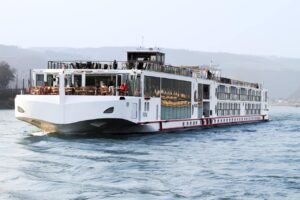



Travel Notes. Day 6. Strasbourg to Mannheim to Speyer to Mainz.
How to react when you peer into the great abyss over and over again.
This is ponderous, man. Really ponderous.
Overnight we traveled from France to Germany, and from Strasbourg to Mannheim. Strasbourg’s history is pretty interesting, but don’t get me started on the order in which Strasbourg was a part of France and then a part of Germany. It’s like all of of Alsace-Moselle (formerly Alsace-Lorraine), in which Strasbourg is located, would be better off independent and called Germance. But yesterday we were no longer in France and we continued along the Rhine to Mannheim, Germany.
I don’t know about you, but every so often I am faced with an existential crisis so huge that if it were not for a strong personal foundation, a firm grasp of my self, and experience with crises in the past, I would imagine that hopelessness is the sole human condition and that all efforts to think otherwise are, well, futile.
Yesterday I had such a day.
Friedrich Nietzche asked what happens when you look into the abyss, and the abyss looks back. Brother Theodore reported that he looked into the great abyss, and the great abyss looked back, and neither of them liked what they saw. You likely know the score.
The point that both Nietzche and Brother Theodore made is that if you truly look into the abyss, a deep and seemingly bottomless chasm, or something that might constitute your own personal hell, you run the risk of being consumed by your fears, your demons, or possibly your mother-in-law, worst case scenario.
For many, death is THE great abyss, as in the future’s uncertain and the end is always clear. But at 72, I’ve seen my parents pass and my two younger brothers pass as well. I like to say, “They’re living together in New Jersey these days.” That puts the future into perspective, and there’s a rich Jewish tradition of using dark humor to confront the abyss as well as various existential crises, and I’m a long-standing member of the in-the-long-run-you-can-never-win club.
But you fight anyway. That’s my version of the human condition. Keep your eyes on the road and your hands upon the wheel, right?
But death is not the only abyss to peer into. Yesterday I was asked a simple question that called into question long-held beliefs, made me look at my personal objectives, and caused me to drop a real good cup of coffee. Maybe it was the time of day, maybe it was being in Germany, maybe it was being on a boat filled with seniors.
The question? What kind of walker are you?
I was asked this question by Jane, our Viking cruise program director in order to place me in an appropriate group of walking tourists to see the great cathedral of Speyer, which by the way has a long history and played an important role at the very beginning of the Reformation. The cathedral was built in the eleventh century and was later used to demonstrate to Rome how powerful provincial Germans were. It’s a remarkable cathedral with an even more remarkable history.
I have learned over the years that just because someone asks me a question, I don’t have to immediately answer it, but at the same time it’s important not to be shocked by such a question. So my immediate reply was, “What walking choices do I have?”
On previous river cruises walkers were broken down into active (runners, bikers, unicyclists, horse back riders, and such), regular (people for whom walking is not something that stops them from doing anything), and slow (walkers with disabilities, limitations – from the neck up or the neck down – and those that require assistance from family members). I never considered that the term slow walkers was demeaning. I thought it was pretty funny.
I’ve been dealing with rheumatoid arthritis since 1983, and while I am in no physical pain, walking over certain surfaces and at certain angles can present me with mobility problems. I don’t have mobility issues, mind you. They’re P-R-O-B-L-E-M-S, and I can recall clearly the last time I ran (in 1987), and it’s only because I’ve been working with a great trainer (Jerry Pasquale) and I continue to do fifty to sixty miles weekly on a stationary bike that I can get around. But European cobblestones? A problem. Stairs? Up, OK. Down? I have to go real slow. Inclines? Not much a problem. Declines? A severe pitch is my biggest problem, and I’m not talking a knuckle curve here.
Jane explained to me that Viking breaks up its passengers into two groups, regular walkers and leisurely walkers. Immediately I knew I was going to be a leisurely walker, a euphemism not much better than a slow walker, but remember, this is me peering into the abyss.
I asked about active walkers. “Not on this cruise,” Jane told me. What about mental walkers (you know, folks with verbal tics, no social skills, exaggerated senses of self, or those who were beaten too often as children or insufficiently as adults)? No. Then how about Johnny Walkers, leisurely walkers who would take a break every time they walked near a bar? No. Dog walkers? No. Anabaptist walkers? Underinsured walkers? Walkers whose spouses have died on more than one occasion? No, no, and no.
I knew then I was on a tightrope ride with nobody by my side. I was all alone, and I might have to find a new home.
I checked with Sara first, and then I told Jane, “Put us down as leisurely walkers.”
On a river cruise such as this one, it’s easy to think that all your cares are taken care of, and problems, well, there are no problems. That’s not the case. And on an ocean cruise, a floating hotel from hell with two thousand, three thousand, or more lost souls, problems are everywhere even though passengers on such ships have to shut down completely to avoid confronting their own souls. Sara and I did one such cruise, and I would only do another if I were paid to be the shipboard Self-Certified Afterlife Coach and Eternity Manager, and I had a private office adjacent to a shipboard bar. Cash payments only. Keep your goddam crypto. No credit cards and no checks, dammit!
With my existential crisis set aside for the time being, and the great abyss, while still unfathomable, boarded up until the next time, Sara and I boarded a Viking bus in Mannheim, where we’re docked, for the ride to Speyer. The tour guide was knowledgeable about European history – a treat for me – and he had a NYC comic sensibility by way of Portugal and Germany.
After our tour, Sara and I headed over to the Jewish Museum in Speyer, a museum adjacent to the remains of the Speyer Synagogue, destroyed in the year 1500 by you know who, and by you know who you know who I mean. It was hard not to think that this was the end, my friend, of our elaborate plans, the end, of everything that stands, the end, no safety or surprise, the end.
Nice little museum, Sara and I agreed as we exited into a little plaza. A grandmother-type – I’d guess about ten years older than me and walking with what I guessed was her twenty-plus year-old granddaughter – stopped Sara and me and asked, “Could you please tell me where the Jewish Museum is? I heard you speaking English. Are you from the states?” I told her we were from the East Coast and that she should continue walking in the direction she’s headed and look for a big sign that reads Museum SchPIRA (Speyer). She turned to me and said that her husband was Jewish and that she felt she should visit the museum because of him. I asked whether her husband was ill or had recently passed. “August,” she said, “he passed away in August.”
I offered our condolences, turned to her granddaughter, and then back to her and said, “You’ll really enjoy the museum.” I thought for a second, and then said the following, not knowing how the line would land. “Whenever I come out of a museum like this, I want to kill somebody.”
She smiled. “I know what you mean.”
A great abyss? Something to worry about when you’ve got time on your hands. Thousands of years of persecution and a healthy knowledge of Jewish history keeps this boy on the straight and narrow, capisce?


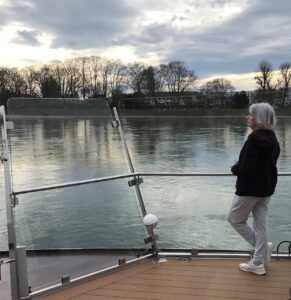
Travel Notes. Day 7.
Traveling along the Rhine, where Habsburg (or Hapsburg) is a common name, and passenger safety is of the highest order. Living in an imaginary material world.
If you want to know more about the Habsburgs and their influence throughout Europe as a result of politically astute planned marriages, see the Habsburg Britannica link I’ve included just below.
https://www.britannica.com/topic/House-of-Habsburg
There’s absolutely nothing new I could possibly add to the story of the Habsburgs except …
… the Habsburgs never had to clean up after themselves, and neither do you aboard the Viking Herja.
On Day 5 of this Viking River cruise – and Day 7 away from home overall – I was struck by what makes intimate group cruises such as ours so special. It’s not the guests, it’s not exclusively the historical sites you see, and it’s not the teeny tiny state rooms.
You don’t have to pick up after yourself, that’s what it is!
Not only do you not have to pick up after yourself, you can leave your room in a mess, your dinner unfinished, your clothing food-stained, your bathroom rank, your bedding sliced into tiny 100% cotton slivers, your adult beverages untouched, your entrees exchanged for fourteen appetizers, your coffee sent back to the kitchen for no clear reason – and the shipboard staff keeps smiling.
Some of you I know are saying to yourselves, “What’s the BFD? I live this way at home!” And I say to you, “Yes, you do, and thank God you’re not aboard the Herja because you wouldn’t experience the full joy of river cruising: leaving your crap anywhere you please.
My guess is that if you were to, let’s say, lose your passport aboard a large ocean liner with three thousand passengers, all imagining that they are traveling to exotic ports of call, living in a style of luxury that only fourteenth or eighteenth or twenty-third or twenty-seventh century French kings could possibly enjoy, and exploring in great depth the lives and cultures of people you could easily find on most street corners in all five boroughs of New York City, you might not see the wallet ever again. But aboard the Herja if you were to misplace your passport it would likely be found and then placed on your freshly made bed in your spotlessly clean room … but only after it was washed, waxed, ironed, and stuffed inside a four millimeter-thick plastic sleeve with a Viking logo on the outside. And a gentle reminder that dinner is anytime you damn well please, and thank you for giving Viking the chance to assist you in your enjoyment of (fill in city and country name here).
For those of you who know me you can guess that I’m not above testing my ideas to see just how accurate they are. I like real research of all kinds, but especially quantitative and qualitative. So I conducted an experiment.
The shipboard custom aboard the Herja is to fold the exposed ends of toilet paper into a triangle, presumably to avoid dangerous paper cuts, and how many of us have suffered from deep paper cuts from grabbing that first dangerous sheet of toilet paper? And how many of us were hospitalized thereafter?
So yesterday after our room was cleaned and before we headed into the German city of Mainz, home to Johannes Gutenberg and the city’s Gutenberg Museum, the highlight of my trip so far, I pulled off the first few sheets of toilet paper and tossed them into a waste basket.
And when Sara and I returned to our room later in the day, boom! The toilet paper end was refolded into a triangle.
I’d like to think it’s done for passenger safety, but the only way to know for certain is more testing. Because without additional testing there’s no way to determine reliability, right?




Travel Notes. Day 8. Traveling along the Moselle in France.
Wisdom acquired. Mark does a Viking spot.

Growing up in a little red house on the edge of a forest in the Flatbush section of Brooklyn, there were three things we were encouraged to be: to be kind, to be honest, and to be hardworking. These are things each of us can control, though many of us exhibit no control and immediately begin talking about ourselves at the drop of a hat, going on and on and on about your own dreadful lives with a failure to understand that strangers you meet don’t care, and failing to realize that you too have to ask questions of others and be prepared to listen. And learn. And sometimes BEFORE you start talking. Make that always before.
Over time, I’ve come to add a fourth important thing.
Not talking so much about yourself, and when you do, please remember to construct meaningful ideas before you begin flapping your chops.
Please don’t talk so much about your inconsequential life, and please don’t talk so much about your past experiences that are at best incoherent, and at worst, make you out to be a small-minded, self-consumed third grader. No, first grader. No talk about the deity you’ve chosen to follow and obey, the name of the church, temple, mosque, or nature preserve you attend, and don’t ask me which church I attend because the only church I attend is the First Church of I Don’t Give a Damn, presided over by the Right Reverend Knowledge Before Belief, and frankly, I have no desire to tell you this unless you start up with me about your Godforsaken spiritual notions.
Instead, shut the hell up and be curious about the world around us, about the history and cultures of places you have yet to see, and don’t ever say, “I didn’t know that” when you learn something new because believe me, sweetheart, nobody cares about what you don’t know, which based on how often you say “I didn’t know that” is a lot. Here’s a clue … look something up before you say “I didn’t know that.” Then DON’T say “I didn’t know that.”
Go now with an open heart, a curious mind, and I really don’t care what other cruises you’ve been on, which pair of favorite slippers you forgot to pack, why you use T-Mobile, why you can only drink Coke and not Pepsi, why your third ex-husband wasn’t as bad as you thought, why chronic diarrhea runs in your family, why you would’ve graduated school on time but instead fell in with a group of traveling dry cleaning salesmen, and whether you were supposed to travel with your ex-wife but she had nose surgery so you had to go with your aunt’s cousin, Shirley, who is insufferable and smokes too much and too early in the day for her own good, and you’ve told her a million times but she just … doesn’t … listen.
I don’t care. Nobody cares. And at the same time you’re sucking the life out of your fellow passengers. Even when you’re on the upper deck outdoors.
Maybe you will find inspiration anew. The world awaits. Closed doors rarely open at your age, but in your case it would be the exception that proves the rule, and I wouldn’t bet on it. Just please think before you start yapping and understand that only family members and close friends care, and even many of them are distracted by their own lives, and if they do care, unless you listen to them they won’t care for long. Strangers? Forget about it.
Here’s some advice. Talk about things that are of interest to others. And if you can’t think of anything, look at a newspaper, pick a neutral subject, read the story, and then ask others what they think. Something in the area of history is usually good and neutral. And if you hear the words Trump or Democrats in the first sentence of replies, excuse yourself and start with someone else. You’re on a cruise. You will never meet all of these people again – ever – which is not a reason to be coarse but is a reason not to have to endure the BS of others.
And finally, drinking to excess because the liquor’s free aboard this river cruise does NOT constitute being curious.
Travel Notes. Day 9. A rainy day in Bernkastel-Kues.
A close analysis of a tricky situation: let them come to us.
Today we’re docked alongside the Moselle River on a rainy late March day in Germany. Next stop? Luxembourg. Then onto France.
Luxembourg’s motto is “mir welle bleiwe wat mir sinn,” which in English means “we want to stay who we are,” to which I will respond, “Fine with me. I want to stay who I am.”
I have been troubled by some of the folks with whom we sit for our daily meals. I usually forgo breakfast for two or four or seven cups of coffee, but Sara usually makes time for a brief breakfast. So breakfast to me is not something I’m terribly concerned with. But then there’s lunch and dinner which involves almost everyone aboard ship, some 180-plus travelers and 50-plus staff.
Now that we’ve been shipboard for six days, various lunch and dinner groups have formed in addition to two eight-to-ten person extended family groups that eat together. Meals are social occasions on river cruises such as ours, and my hypothesis is that there are some folks here who are interesting, playful, informed, and not inclined to tell you long and pointless stories about their beliefs, their medications, their long and successful former careers, and their favorite conspiracy theories.
The only question is how to find them.
We’ve already checked off about ten folks with whom we’d prefer not to dine with for some or all of the above reasons, but nod hello to in passing because, after all, we’re in this together. And then there’s another ten or so who were indifferent or sullen to us at the outset of this cruise for unknown reasons who turned out to be good folks due to who knows what? Canker sores? Pustules? Troubling islets of Langerhans?
So I took the skills at my disposal, and then blended sociological and statistical models to take a reasoned approach to seating arrangements for breakfast, lunch, and dinner. I accounted for day of week, barometric pressure, bartenders on duty, and came up with the following.
Let people come to us.
I looked at the dining room as a social rectangle with four corners, two of which were at the room’s entrance and wouldn’t give folks rushing in to chow down – with blinders on – an opportunity to see us. If this were a war film set during WWII we could pick off the first fifty or so folks entering without any knowing what hit them. But I digress.
And so far we’ve had four of our last five meals with class A folks. What a revelation. They spoke, we responded. Add wine or other spirits, rinse, repeat.
Speaking of revelations, let me tell you about our one miss. Last night I was running late for dinner and Sara couldn’t get to one of the far corners of the dining room fast enough to secure a table that would put us in position to see and be seen.
When I entered the dining room I saw that Sara was seated in the middle of the room and to the room’s right side at a table for six with two other couples, one of whom was a couple we had eaten with prior and pleasant enough but felt compelled at that time, perhaps by a higher power, perhaps by an ill-formed sense of humor, perhaps because they got a bounty for every person that would listen to their … ahem … beliefs … to tell us about their “journey,” why they moved from California to rural Texas (according to them, to follow a pastor), and new on this evening, that Satan is the reason for the evil in this world. While I did offer that evil existed well before notions of moral order were constructed, I held myself back from saying that “I believed that satin is the reason for evil in this world.” The other couple was from Utah, also nice enough, and if I had to guess were followers of The Church of Jesus Christ of Latter-day Saints, but since they appeared to be mildly dumbstruck by the Satan remark and did not mention religion once all evening they just as well could have been from the Buddhism wing of Mormon beliefs. It was hard not to think of Stealers Wheel line, “Prosletyzers to the left of me, God knows what to my right, here I am stuck in the middle with Sara and an IPA in my hand.” At some point during dinner Sara touched my cheek and whispered to me that I was being a good boy.
Because we were in Germany the Buddhist Mormons and I talked about Waldensians and Anabaptists, religious groups with distinct beliefs that emerged as part of the early radical stage of the Reformation and of course, of course … OF COURSE … were persecuted by the Roman Catholic Church. Our born anew friends, neither dumb nor spring chickens, seemed to be dumbfounded that they didn’t have a monopoly on beliefs and only then it may have dawned on them that religious ideas could be discussed within the neutral context of history and the glorious tradition of the RC Church’s persecution of non-believers. But I doubt it. I turned at one point to our dumbfounded friends to remark that they would enjoy looking at the beliefs of the Cathars, pre-Reformation rebels who believed that all humans were captives of an evil God until their death, whereupon they would be reincarnated again and again and again until they reached salvation and joined a perfect God. Somewhere, and maybe even in Texas, where our table mates currently lived. You can’t make up stuff like this. I even mentioned that I had visited an old RC Church in Cochem, Germany (COKE em) the day before with a gift shop where I asked to buy a dozen indulgences and was told to come back on Sunday, when I could get a baker’s dozen: 13 indulgences for the price of 12. Both the freshly reborn and the Buddhist Mormons didn’t quite get it.
What can you do?
And still we survived.
So tonight, Sara and I can’t wait for dinner. And conversation. And an accompanying adult beverage.
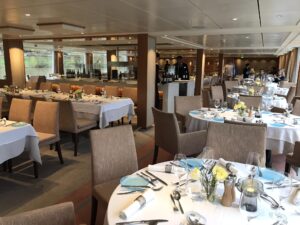
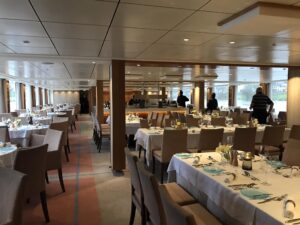
Travel Notes. Day 10. From Trier to Paris.
A tramp aboard the Herja. Choices we make, beliefs we hold dear, and professing to be open-minded to self and others, with apologies to R.D. Laing.
Some following my notes have expressed disdain for river cruises, possibly because the PBS images of happy middle-aged couples toasting each other and toasting their fellow passengers and being toasted by shipboard staff and kvelling over haute cuisine from each country you visit while viewing breathtaking views of hills, mountainsides, rivers, lakes, and puddles reflecting only your dreams and your successes, and hugging plump bakers in bakeries with old stone ovens and opening doors in fabulous museums to find world-class art with a camera following you into an empty room that makes you appear to be much slimmer and the center of attention … hell, you do realize that the images are from a commercials, right?
It’s not real. It’s imagery. You don’t look that good and neither does the cruise.
Instead, I ask that you complainers take the rest of the day off, because you … yes, you … have inspired me.
I understand exactly how you feel. My choice would be to lie on a Caribbean beach with my only concern being where and when to eat dinner. Even so I would seek out fellow travelers to find out about their lives.
I’m going to presume you’ve traveled a bit, translate apps notwithstanding. So have I.
And I couldn’t fault you for finding other than what you find to be like-minded Americans small-minded. I do too. But most folks I’ve met from all around the world are no more like-minded or small-minded than Americans, no more or less geocentric, and no more or less likely to look at you as an opportunity to offload their craziness. Please avoid offloading yours, here, there, and everything, everywhere, all at once.
Many of those noble others you imagine elsewhere are a hell of a lot worse. Look at a good newspaper or better yet, The Economist. Read. Imagine a map where the U.S. is not in the center.
Older American travelers may be physically larger than the general population in other countries, but many from other countries are catching up, and only thing most of the folks on this cruise have in common is they’re seniors, though there are exceptions.
But most important, sometimes you do things and go places and experience things outside of what you feel comfortable doing because of ones you love, whether they be long-departed grandparents, less long-gone parents, still-living parents (as I note below and was touched by), a husband, a wife, a boyfriend, a girlfriend, your children, and once in a while, a beloved artist or entertainer. It’s only if you’ve got no one that you can make your personal demands demands for others. In my case, Sara (my wife) loves these cruises, we can afford them (fortunately) and I am somewhat limited due to long-standing – and I have trouble standing for long periods of time – rheumatoid arthritis. And I don’t mind being challenged by others, principally because I’m confident I can hold my own or put such people in their places, barring firearms.
I also see aboard this cruise four separate younger-than-senior individuals accompanying what I can only assume to be their much older parents, parents who require mobility assistance, and I for one believe that such children-adults deserve guaranteed reservations in a heaven I don’t believe in or a real life get-out-of-jail card, and frankly I don’t give a crap about their political orientation. Admiration for these adults is maybe the only thing that all cruisers aboard the Herja have in common apart from spotty WiFi service.
I’m writing these pieces to keep myself sane, and I intend to collect them and put them up on my web site under the title, A Tramp Aboard (with apologies to Mark Twain): Zürich to Germany to France is Like Tinker to Evers to Chance. These pieces are meant to be funny, and if they’re not, what can I do? It’s a vanity web site, so I really don’t care, and www.MutualOfRosenblatt exists because I’m willing to pay for it.
Still I hear you. Therefore I contacted Viking CEO Torstein Hagen and asked that your name be placed on a Viking NO GO list and Hagen has confirmed that you will never be forced to take a Viking Cruise. Ever. If you’d like I’ll contact the Washington Post and alert the Post to how you feel. But I’m certain you would get more satisfaction than me from doing so. And once you’re on a Viking NO GO list for sixty days, such NO GO instructions go out to all other cruise lines, bus tour operators, and major car rental operations.
Essentially you can live fully satisfied in your own world.
No one need do anything that they feel opposed to strongly. And I will defend to my next-to-last breath filled with the aroma of Katz’s pastrami your right to feel as you do. But there’s got to be good deli-style mustard on the pastrami and the pastrami better be on deli-style club bread.
Or else the deal’s off. Understand?


Travel Notes. Day 11.
When too broad a net catches no fish. Yet still you are here. Saying farewell to the Herja in Trier, and then traveling in coaches through Luxembourg to Paris.
Yesterday morning following a shipboard ceremony where Herja staff members, from captain on down to the cleaning staff, bid us a fond farewell by transporting our luggage to four coaches dockside accompanied by inspirational musical pieces from Die Walküre and Cavalleria rusticana, and the national anthems of Switzerland, Germany, Luxembourg, and France, Sara and I hit the road, Jacques.
It was a particularly emotional moment for me as I hugged the two people aboard the Herja who more than anyone else made my river time pleasant, Oaster and Musan, the two best bartenders I ever spent a week with.
Strangely they didn’t reciprocate my somewhat sentimental attachment, and when Oaster said to me, “Mark, don’t worry. We’ve already begun to forget about you,” I sensed a snub.
I must admit I was hurt when these two guys I thought were friends began laughing as they occasionally looked back at me.
“I’ve been hurt before,” I thought to myself as I climbed onto the bus, “and I’ll be hurt again” as I tripped over our tour guide’s headset-microphone.
Our first stop was the Luxembourg American Cemetery, a resting place for more than 5,000 American service members who fought and died in WWII, among them General George S. Patton. Then back on the bus as we headed onto Paris with a stop in Reims to see its Gothic cathedral, a facility famous for being the location where French kings were anointed as direct representatives of God going back to the late Fifth Century.


Then back on the bus as we headed into Paris and our hotel in the fifteenth arrondissement during Monday evening rush hour. Traffic in Paris during a Monday evening rush hour looked pretty civilized to this veteran Manhattan driver.
Sara and I prepared this Tuesday morning for a bus and walking tour of Paris, a city that Sara’s been to but I had yet to visit. We visited the Eiffel Tower, drove down the Avenue des Champs-Élysées, and walked by the Sorbonne. Sara and I took a break at a coffee shop bar where we were joined by our born again friends who were awfully nice people when they weren’t talking about their journey. Sara then wandered off after agreeing to meet up with me when our walking tour picked up at a nearby garden in less than a half hour.
When I wandered over to the garden to meet up with our tour guide, one of our fellow travelers said something that tied together some loose threads for me about some of my tour mates. One woman walked up to the tour guide and said, “My crepe wasn’t filled.”
Think about it. I did. And then it hit me.
Declarative statements. And declarative interrogatives.
A declarative statement is any sentence that is definite and clearly formed. “My crepe wasn’t filled,” is definite and clearly formed, but in my mind always begs the question, “So what?” Now I can presume that the woman who said these dramatic words was expressing surprise in the form of a declarative statement, but maybe I’m wrong, but even if I’m not, how do you respond to a declarative statement such as this one?
There are three ways that I have developed to respond to declarative statements, and I’ll use the crepe statement to show you.
Statement: My crepe wasn’t filled.
Mark Answer 1: Yes, your crepe wasn’t filled.
My goal in this example is to let the speaker know I understood that his or her crepe wasn’t filled.
Mark Answer 2: Yes, your crepe wasn’t filled. Yet still you are here.
My goal in this example is to let the speaker know that he or she is still alive regardless of the filling status of his or her crepe.
Mark Answer 3: Yes, your crepe wasn’t filled. Do you wish to dance the rhumba?
My goal in this example is to shock the speaker out of his or her complacency with the first words of Spanish I learned in seventh grade, “¿Quiere baila la rhumba?” That was the very first time I questioned the sanity of any teacher I had. How would “¿Quiere baila la rhumba?” ever be useful to me anymore than “Do you want to dance the rhumba?”
But I was only twelve at the time. I wasn’t thinking clearly. My Spanish teacher was using an absurdity to teach me about life. And declarative statements. Thank you, Señorita Weinberg!
Fortunately in this case, our tour guide handled this fraught situation, which gave me the opportunity to consider other things I heard over the course of this trip. Many declarative statements that struck me were so unfocused or so ill-constructed that I thought I was forty years younger and listening to my older daughter at the age of three.
Some things were said to no one in particular, and those were the ones that struck me the most. Some statements that appeared to be questions were only so because these statements appeared to have an upward vocal inflection at the end, and others were simply interrogative expressions of frustration.
I’m not a neurologist or gerontologist, but I would guess that my fellow seniors are not suffering from cognitive decline but instead have been driving this way since they obtained their very first licenses.
Asking questions to acquire information is one of the most basic of linguistic approaches. Asking questions without directing them to someone who can provide you with answers is pretty scary to me.
“Is this the blue bus?”
Spoken out loud and to no one in particular as a person got on a bus designated as BLUE. This one still haunts me daily.
“I don’t know what time it is.”
Thinking this to yourself is one thing, a thought that prompts you to look for a clock, a watch, or a cell phone. But spoken aloud makes me think that your internal brain-to-mouth buffer is shot.
“I get mixed up about churches.”
I think you need to see a church psychologist. Or maybe you need to explain yourself better.
“I don’t know where my (fill in the blank HERE) is/are!”
Again, to no one in particular. A new form of speech: public self-criticism.
“But I had a hamburger last night!”
To which I say, “¿Quiere baila la rhumba?”
“The potatoes are different than what I’m used to.”
Yes they are, yes they are. Yet still you are here.
“Satan is the reason why there’s so much evil in this world!”
Yes, and God must love atheists because he made so many of them.
Is there some universal need to call out into a personal void, to discharge incoherent thoughts into the public sphere, to release confusion into the natural world in fewer syllables than traditional haikus, or is there an underlying belief – in some – that a God is out there whose only job is to answer unfathomable questions of the lowest possible order and of consequence to no one but you?
Certain questions are challenging for most humans. Why are there wars? Why do good people sometimes suffer for no clear reason? Why did my mother or father do what they did? For me it’s been why did my younger siblings die before me? And perhaps learning about others or yourself will give you answers, even if they’re only partial answers. Maybe a personal belief in your own deity will help you.
But no understanding of that which cannot be understood will tell you the answer to declarative statements for one basic reason.
They’re not questions. Directing a question to the right person isn’t easy, but if you want answers, I suggest thinking about finding the right person first. Or go to your preferred Internet search engine and type in a question.
I don’t need ChatGPT to tell me that if I type in IS THIS THE BLUE BUS or MY CREPE WASN’T FILLED into Google I will not get any useful answers.
Because I just did and I didn’t.
Tomorrow we head back from Charles de Gaulle Airport to lovely and talented JFK.
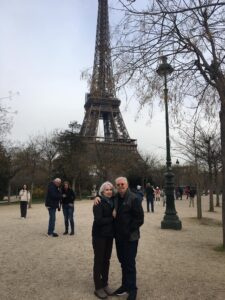
You are a real badass.Love your writing and the sarcastic drippings that gets all over me as I read your drivel.Just keep writing .
I LOVED this memoir of your trip. Kept me laughing all the way through.